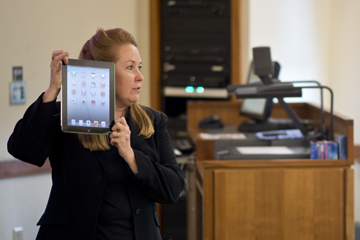Faculty see tablets as versatile teaching, learning tools
September 21, 2012
 |
|
Lorraine Kisselburgh,
assistant professor of communication, uses an iPad during a class about women
and leadership, which she teaches with Beverly Davenport Sypher, professor of
communication and vice provost for faculty affairs. (Purdue University
photo/Andrew Hancock) |
Since May 2011, the sight of students tinkering with iPads while their teacher looks on has been a common one in Lorraine Kisselburgh's classes.
Kisselburgh, assistant professor of communication, is one of a growing number of Purdue faculty members who are using iPads, tablets and similar devices in the classroom. For Kisselburgh, these devices are more than just high-tech toys -- they're powerful tools that can transform the way students approach learning.
"Using iPads in the classroom changes the nature of student-instructor interaction," Kisselburgh says. "You're able to dynamically interact with the students while they’re actively engaging with new material. That's really the appeal."
Last spring, the Brian Lamb School of Communication received a $23,320 grant from the Provost's Office to purchase 25 iPads and 25 iPod Touches, based upon a proposal from Kisselburgh and Sorin Matei, associate professor of communication. Kept in a mobile cart, the social media lab supports instructional needs for school's faculty members, allowing it to be used in multiple classroom venues, including in the field,
The devices particularly came in handy, Kisselburgh says, during her class on emerging technologies. In that case, each of Kisselburgh's more than 90 students were able to experience and directly engage with the technologies they were studying, as well as use the devices to facilitate discussion. During class, students used Purdue University’s Hotseat application on the iPads to post questions and respond to discussion points during Kisselburgh's lectures.
Other faculty members across campus are using iPads and tablets for myriad purposes. They include Eric Nauman, associate professor of mechanical engineering, who uses an iPad to record videos of his graduate class lectures; he then posts the files online for students to access outside of class. For his undergraduate classes, Nauman creates videos of homework solutions so students can experience in-class material from different perspectives.
"The iPad has enabled me to provide more feedback to my students, and it's provided a means for ensuring students are able to keep up with the class," Nauman says. "My hope is that encouraging active learning in class as well as reflective learning outside of class will make a difference."
On Tuesday (Sept. 25), Jason Bruder, an Apple systems engineer, will talk about using iPads in the classroom during an event open to all faculty and staff. Kevin O'Shea, ITaP educational technologist, also will talk about the group's studio projects. They include Passport, a tablet application that allows professors to award badges to students for academic progress, and Jetpack, which allows professor to create application and e-book hybrids that can replace classroom texts.
The event will take place from 1:30 to 3:30 p.m. in Stewart Center, Room 206. The College of Liberal Arts Office of Information Technology is presenting.
Adam Hagen, ITaP educational technologist, has worked with several faculty members who are using or hope to use tablets in their classrooms. Most of the faculty interest in the technology, Hagen says, has happened since the creation of ITaP's iPad and Tablet User Group in fall 2011.
Faculty members' plans for tablets in the classroom have varied from use as a professor's lecture aid to use by students, based on a group purchase funded by a grant. Faculty interested in speaking with Hagen about this subject may reach him at hagenab@purdue.edu.
The next user group meeting is scheduled for Oct. 2. More details can be found at https://wiki.itap.purdue.edu/display/tabletusrg/iPad+and+Tablets+User%27s+Group. Career Account login credentials are required for access.
At the Fort Wayne campus, Project #mobileEDU has trained three faculty cohorts and one student cohort in the use of iPads. The project includes a new component in which faculty and students in five specific classes will be outfitted with the devices to study how they might affect teaching and learning in the classroom.
In the future, Nauman hopes to team with Chuck Krousgrill, professor of mechanical engineering, and Jeff Rhoads, associate professor of mechanical engineering, to pursue grant money to buy up to 120 iPads. The devices would enable the faculty to project individual students' work on large screens during class. Details of this project, Nauman said, will be determined next summer.
For Kisselburgh, the School of Communication's iPads integrate with her research as well. She and Karthik Ramani, the Donald W. Feddersen Professor of Mechanical Engineering, soon will embark on long-term, National Science Foundation-funded research into how the use of tablets, and other natural user interface tools, might affect brainstorming in design teams.
"Even though we already know them as great teaching and learning tools, the use of tablets may be able to provide even more benefits than we currently realize," Kisselburgh says.
"For example, if engineers can sketch out their thoughts as they are being formed, and quickly share the representations of their ideas with others in their team, how might that change ideas and lead to better collaboration when a group works together? For us, this is an exciting question, and it's one we hope leads to interesting insights about design and collaboration in cyber-enabled environments."
Writer: Amanda Hamon, 49-61325, ahamon@purdue.edu

